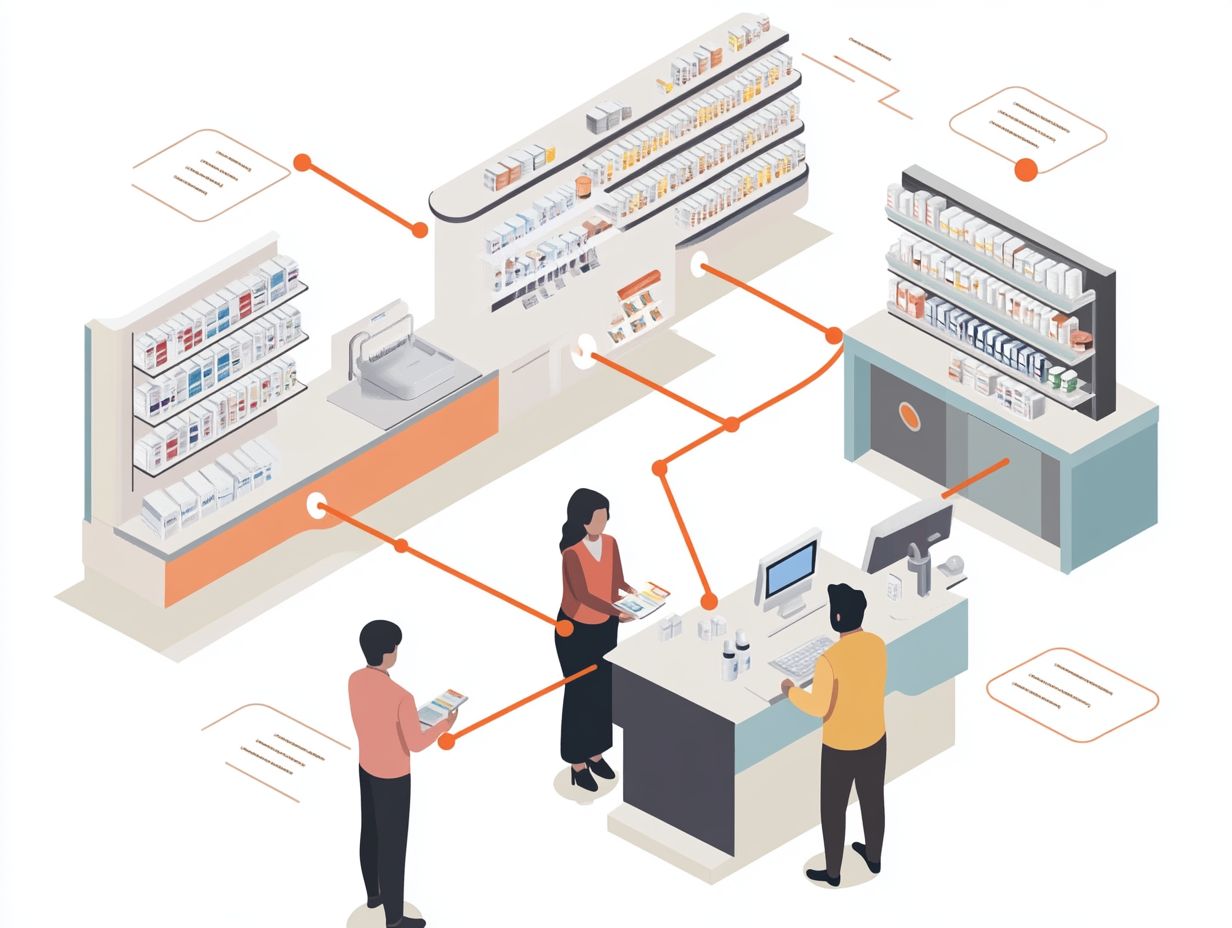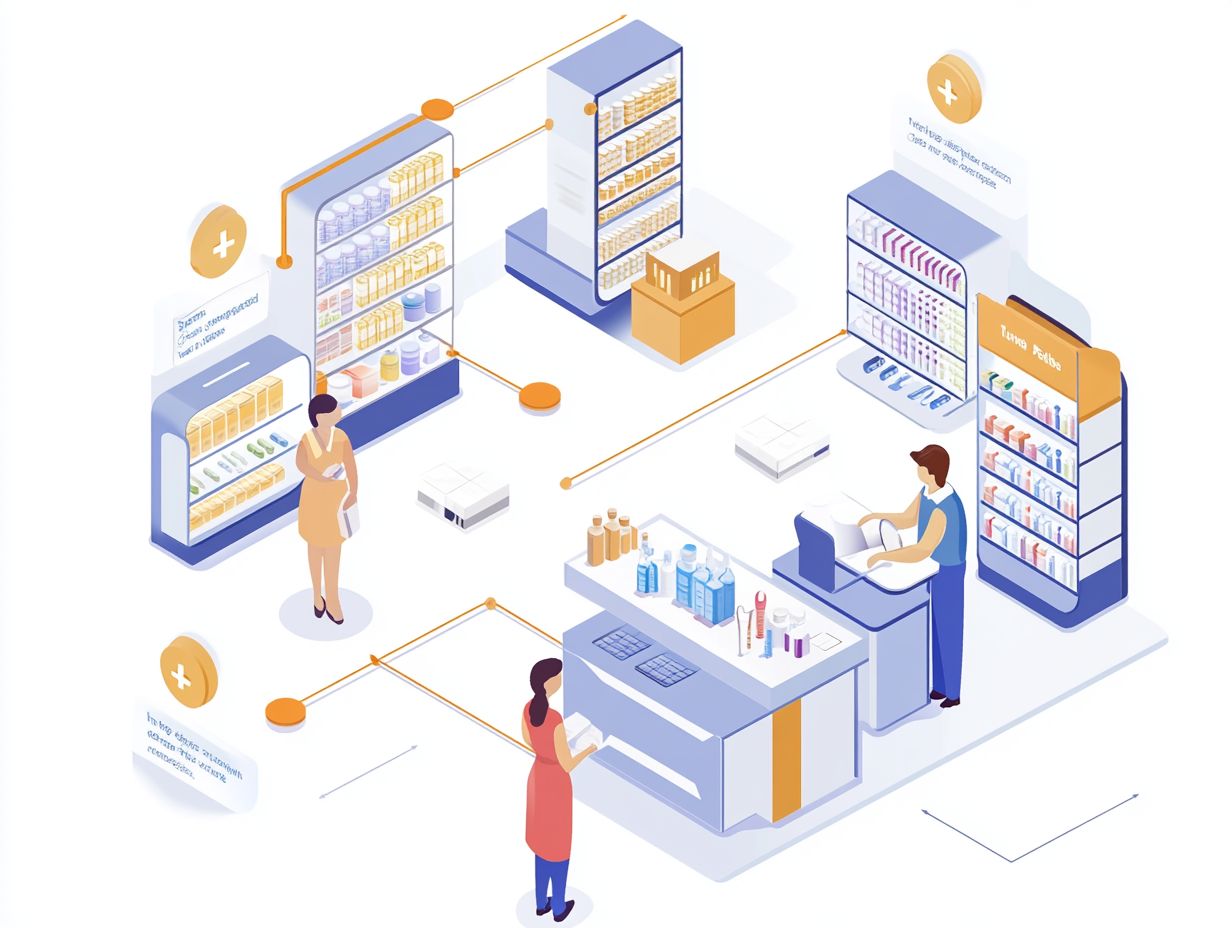Navigating the pharmacy process is essential for ensuring effective medication management and optimal health outcomes. This guide provides a comprehensive overview of the pharmacy process, highlighting the critical role of pharmacists, how to choose the right pharmacy, obtaining and filling prescriptions, managing medications, dealing with high-cost therapies, and addressing insurance and healthcare costs.
Pharmacists are healthcare professionals who dispense medications, manage drug interactions, and provide valuable guidance on medication use. Their role is critical in patient-centered care and ensuring optimal clinical outcomes. Choosing the right pharmacy involves considering:
- Location
- Services
- Insurance compatibility
- Customer reviews
to ensure better healthcare outcomes and patient satisfaction.
Obtaining and filling prescriptions requires coordination between healthcare providers and pharmacists, especially for specialty medications that may need prior authorization. Effective medication management includes:
- Organizing
- Monitoring
- Consulting with healthcare providers
to prevent drug interactions and ensure proper usage.
Understanding insurance coverage and managing costs are crucial for accessing specialty medications. Reviewing policies, contacting pharmacy benefit managers such as OptumRx, Cigna Specialty Pharmacy, Express Scripts, and Humana Specialty Pharmacy, and exploring financial assistance programs can help reduce out-of-pocket expenses and achieve cost savings.
By following these guidelines, patients can navigate the pharmacy process efficiently, ensuring safety and adherence to treatment plans for better health outcomes. Clear communication with pharmacists and understanding the pharmaceutical landscape are critical for achieving optimal patient outcomes.
Key Takeaways:
Understanding the Role of a Pharmacist

A pharmacist is a healthcare professional responsible for dispensing medications, managing drug interactions, and providing medication guidance to patients. Pharmacists also play a role in the healthcare system by improving patient care and ensuring the proper use of medications.
Pharmacists work with healthcare providers to ensure effective medication management, especially for complex conditions like HIV, cancer, and autoimmune disorders. They ensure specialized care tailored to individual patient needs.
Pharmacists play a key role in improving patient outcomes through medication expertise and communication. Their involvement in the health system is critical for enhancing clinical outcomes and patient-centered care.
What Pharmacists Do and How They Can Help
Pharmacists manage medications, dispense prescriptions, and educate patients on medication use and side effects.
Pharmacists help by monitoring patient therapies, ensuring adherence to treatment plans, and collaborating with healthcare providers to prevent drug interactions.
Pharmacists enhance patient safety and treatment outcomes through their expertise in pharmacotherapy.
How to Choose a Pharmacy
Choosing a pharmacy involves considering factors such as location, services offered, insurance compatibility, customer reviews, and accreditation by organizations like the Accreditation Commission for Health Care and the Utilization Review Accreditation Commission.
Location is important for convenience and timely access to medications.
- Evaluate the services offered, including medication management, delivery options, and specialty medications.
- Ensure the pharmacy accepts your insurance plan to avoid unexpected costs.
- Check customer reviews for insights into the pharmacy’s service quality and reliability.
Choosing the right pharmacy ensures better healthcare outcomes and patient satisfaction.
Factors to Consider
Choosing a pharmacy requires considering factors such as specialty pharmacy services, healthcare provider expertise, patient care effectiveness, and pharmacy oversight. Specialty pharmacies like University of Illinois, Cleveland Clinic, and Vanderbilt Specialty Pharmacists can offer higher levels of care for complex conditions.
Specialty medications require pharmacies to manage tailored treatment approaches carefully, ensuring adherence to high standards set by entities like the Pharmacy Quality Alliance and the American Society of Health-System Pharmacists.
Accessibility to pharmacists for consultations enhances patient experience by providing immediate answers to medication questions.
Proactive management of drug interactions by the pharmacy ensures optimal patient outcomes.
Obtaining a Prescription

Obtaining a prescription involves visiting a healthcare provider, who evaluates your condition and determines if medication is necessary.
If approved, the healthcare provider writes a prescription, which you can then fill at a pharmacy, including specialty pharmacies for high-cost therapies.
For specialty medications, obtaining a prescription may require prior authorization from the healthcare provider and approval from a pharmacy benefit manager to ensure coverage. This process is crucial for managing healthcare costs and ensuring access to necessary treatments.
Process and Requirements
The process of obtaining a prescription for specialty medications begins with a healthcare provider consultation to evaluate patient needs. This is often necessary for managing complex conditions and ensuring specialized care.
Documentation such as prior prescriptions and insurance information helps streamline this process.
After evaluation, healthcare providers may coordinate with pharmacists to file paperwork and send prescriptions to the pharmacy, ensuring proper pharmacy oversight and adherence to treatment plans.
Patients receive guidance on side effects, outcomes, and follow-up consultations for monitoring treatment progress. Clear Minded Care is essential for addressing any adverse events and ensuring patient safety.
Filling a Prescription
Filling a prescription for specialty medications involves several steps.
-
First, the healthcare provider writes a prescription for the specialty medication, ensuring all necessary documentation is complete.
-
Second, the patient submits the prescription to a specialty pharmacy, such as Cigna Specialty Pharmacy or Express Scripts, which specializes in handling high-cost therapies.
-
Third, the specialty pharmacy verifies insurance coverage and obtains any necessary prior authorizations. This step ensures the patient receives timely access to their medications.
-
Fourth, the pharmacy prepares the medication and provides patient education on proper use, including information on potential drug interactions and side effects.
-
Fifth, the medication is delivered to the patient or picked up at the pharmacy, ensuring the patient can start their treatment promptly.
These steps ensure effective medication management and patient safety, contributing to better healthcare outcomes.
Steps and Options
To fill a prescription, patients can use specialty pharmacies with options including:
- In-person visits, which offer direct consultations with pharmacy staff.
- Mail-order services, which deliver medications to patients’ homes, often with automatic refill options.
- Digital platforms, which allow prescription management and refill requests via apps or websites.
Communication with healthcare providers and pharmacy staff is essential for coordinated care.
Managing Medications

Managing medications involves organizing, monitoring, and administering prescribed drugs to ensure correct usage and minimize risks.
Medication management includes tracking doses, managing refills, and coordinating with healthcare providers to prevent drug interactions and adverse events.
Effective management is crucial for patients with complex conditions and those using specialty medications.
Tips for Organizing and Taking Medications
To organize and take medications, use pill organizers, set reminders, and keep a record of all medications.
Using technology, such as mobile apps for medication adherence, can help track dosages and send notifications to avoid missed doses, enhancing patient outcomes and adherence to treatment plans.
Consulting with pharmacists about potential interactions and scheduling regular medication reviews with healthcare providers ensures proper therapy adjustments.
Dealing with Insurance and Costs
Dealing with insurance and costs involves understanding how insurance coverage affects access to specialty medications and managing out-of-pocket expenses.
Insurance impacts medication access by determining coverage limits, copayments, and prior authorization requirements.
Understanding costs helps patients plan for and manage expenses associated with specialty medications, ensuring access to necessary treatments.
Understanding Coverage and Saving Money
Understanding insurance coverage for specialty medications involves reviewing policies to clarify coverage specifics and out-of-pocket expenses. This can be managed by consulting with your pharmacy benefit managers for detailed information.
Contacting pharmacy benefit managers helps with prior authorizations and formulary insights, aiding in cost savings.
Financial assistance programs from pharmaceutical companies or nonprofits offer help to reduce costs of specialty medications, providing much-needed support for patients receiving high-cost therapies.
Frequently Asked Questions

What is the pharmacy process?
The pharmacy process refers to the steps involved in obtaining medication from a pharmacy, including prescription filling, insurance verification, and medication dispensing.
Why is it important to know how to navigate the pharmacy process effectively?
Knowing how to navigate the pharmacy process can save you time and ensure that you receive the correct medication and dosage for your health needs.
What are the key steps in the pharmacy process for obtaining specialty medications?
The key steps in the pharmacy process typically include receiving a prescription from a healthcare provider, submitting it to a pharmacy, insurance verification, medication dispensing, and patient education on proper usage and potential side effects.
How can I find a reliable pharmacy for my medication needs, especially for specialty medications?
You can ask for recommendations from your healthcare provider, research different pharmacy options in your area, and check customer reviews to find a reliable pharmacy for your medication needs.
What should I bring with me when visiting a pharmacy, especially for high-cost therapies?
Make sure to bring your prescription, insurance information, any discount cards or coupons, and a list of any allergies or current medications you are taking with you when visiting a pharmacy.
What if I have questions or concerns about my medication during the pharmacy process, including potential drug interactions?
If you have any questions or concerns about your medication, don’t hesitate to ask the pharmacist for clarification. They are trained to provide information and address any concerns you may have.





